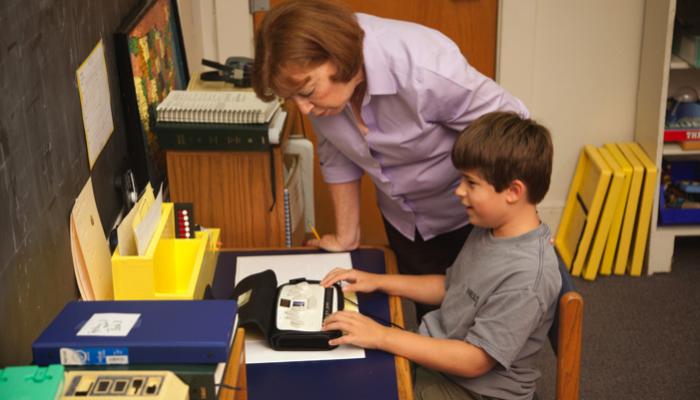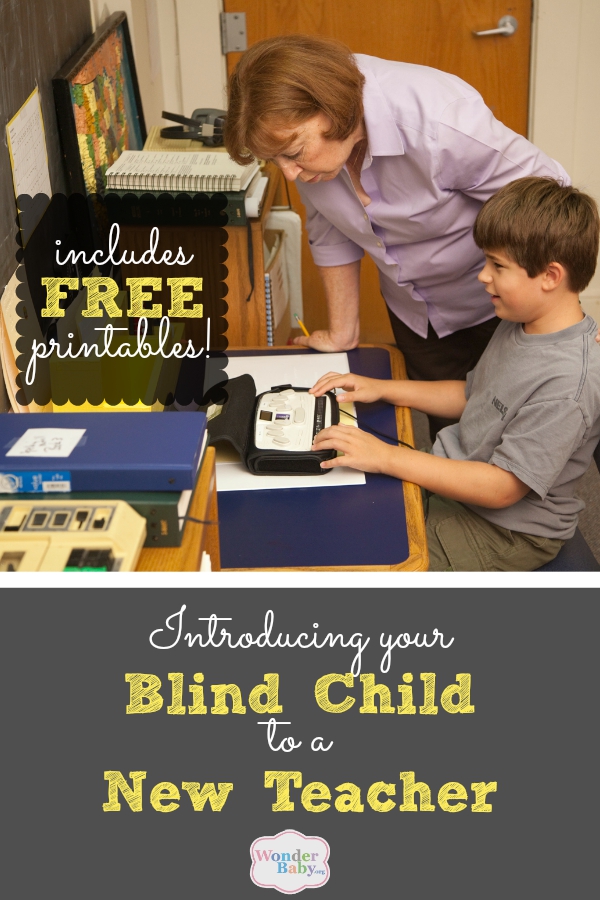Introducing Your Blind Child to a New Teacher

When your child has special needs it’s kind of scary to hand him off to a teacher at the beginning of a new school year. When your child is visually impaired it’s maybe even a little bit scarier since blindness is such a “low incidence disability.”
Will your child’s new teacher know how to interact with him? Do they really understand what it means to be blind or to have low vision?
Even if your child is in a school for visually impaired students and working with professionals with extensive experience with blind students, the transition to a new teacher and a new classroom can still be difficult. How can you explain all of your child’s personal quirks and idiosyncrasies to their new teacher? Will you have the chance to have an in-depth conversation before school starts?
As a parent of a blind child with multiple disabilities I’ve found that these worries are generally mostly my own. Usually my son is perfectly happy to enter a new classroom and his new teacher is more than ready to welcome and accommodate him. But I can’t help worrying that things will go wrong anyway.
If you have these same worries it might be a good idea to create a welcome packet of materials about your child and their disability. You can give this information to your child’s new teacher as a way to explain who your child is, how they communicate and how best to interact with them. For children with multiple disabilities this can be extremely helpful for their new team, but it’s probably a good idea to prepare a welcome packet for any child with special needs.
Information Worksheets
A good place to start is with this simple collection of worksheets. You can download, print them up and fill them out as best as you can. If you have any suggestions for new worksheets or different answers, please let us know!
- About Me: This worksheet is a lot like a cover letter. It’s nice to attach a photo of your child and just introduce who they are and what they like (and don’t like). For an example of what this worksheet may look like when filled out, click here.
- Personal Fact Sheet: This sheet gets into a bit more detail about your child’s diagnosis, physical conditions and medications. For an example of what this worksheet may look like when filled out, click here.
- Communication Profile: For children who are nonverbal or have different modes of communication, this sheet will help you explain how best to communicate with your child. For an example of what this worksheet may look like when filled out, click here.
- Medical Quick View: If your child is medically complex, check out this worksheet designed by Catherine Rose. She’s created a one page quick view that you can fill out with all of your child’s major medical concerns and history.
It may also be a good idea to just sit down and write a letter to your child’s teacher explaining your child’s background, their needs and the best way to work with them. It may sound like a bit much, but your child’s teacher will be grateful for the information and hopefully this will encourage open communication throughout the school year. For a great example, check out this family’s letter: What You Should Know About John.
Or how about trying this… if your child is old enough and able, they could write a short speech and introduce themselves to their fellow classmates and new teacher! This idea was shared on the WonderBaby Facebook page by Michelle. She says that her son, Jalen, gave a speech to his class about microphthalmia and what it means to be legally blind. You can read his speech here.
General Information for Teachers Working with Children with Visual Impairments
Check out the articles below and print them up or send links to your child’s teacher. These articles offer great general advice on how to introduce a student with visual impairments to a new classroom.
- Twelve Tips for Classroom Teachers: Barbara Cheadle writes about her experience with her son, Chaz, and gives tips on how best to work with kids with low vision.
- Tips for Teachers: Another collection of basic tips, this one from Emily Coleman on Family Connect.
- General Considerations in Working with Young Children with Visual Impairments: This is a nice in-depth article that outlines ways young children with little or no vision can be engaged in a mainstream classroom.
For Children who are Deaf-Blind
The National Consortium on Deaf-Blindness (NCDB) has an amazing collection of articles and downloadable fact sheets about deaf-blindness. You can browse through all of their offerings here or you can download a few of our favorites below:
- An Overview on Deaf-Blindness
- Effective Teaching Strategies & Techniques for Deaf-Blind Students
- The Roles & Responsibilities of Team Members for a Student who is Deaf-Blind
- The Importance of Hands for the Person Who is Deafblind
- Communication Fact Sheets for Deaf-Blind Students
For Children with Multiple Disabilities
Children with multiple disabilities are very different and each child is unique and has their own set of issues, but there are some general guidelines teachers can follow. You may want to print the following article to give to your child’s teacher:
More Information About Specific Diagnoses
The Blind Babies Foundation offers some printable fact sheets about specific diagnoses that you can download and hand out to new teachers. This is a quick way to help them understand what to expect from your child and what their diagnosis really means.
- Cortical Visual Impairment (CVI) Fact Sheet
- Retinopathy of Prematurity (ROP) Fact Sheet
- Optic Nerve Hypoplasia (ONH) Fact Sheet
- Albinism Fact Sheet
- Optic Nerve Atrophy (ONA) Fact Sheet
- Retinal Diseases Fact Sheet
You can find these fact sheets and others in both English and Spanish here.

Related Posts

Eye Conditions and Syndromes, Visual Impairment
Neuralink Announces Plans to Restore Sight to the Blind with Brain Chip
Elon Musk’s company Neuralink has announced plans to begin human trials of its new “Blindsight” brain chip by the end of 2025.

IEPs
What Should I Bring to My Child’s First IEP Meeting?
Prepare for your child's first IEP meeting with confidence! Discover exactly what documents to bring, including educational records, medical info, and questions to ask.

Visual Impairment
The Gift of Understanding: How a Young Child Helps His Blind Father Navigate Life
When a parent is blind, it’s natural for people to wonder how their sighted child will adapt. Will they struggle to understand their parent’s needs? Will they feel burdened by...